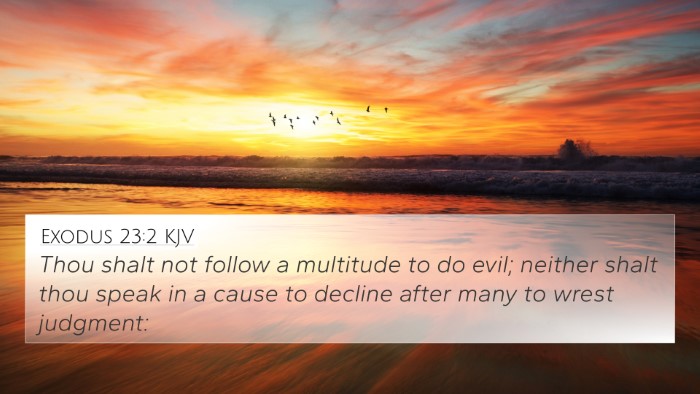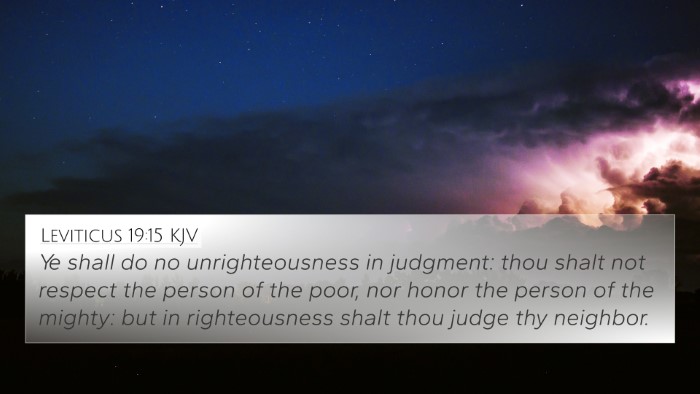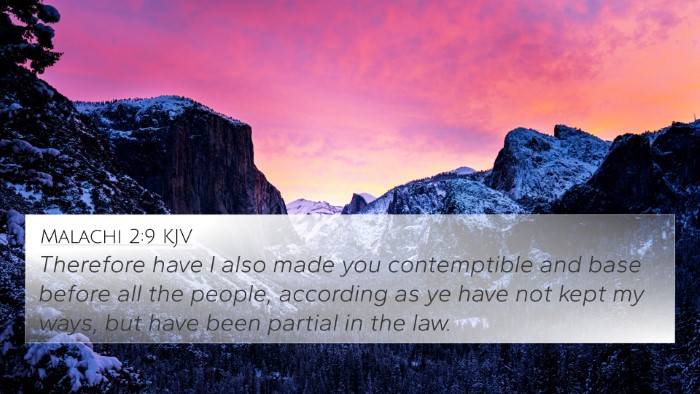Old Testament
Genesis Exodus Leviticus Numbers Deuteronomy Joshua Judges Ruth 1 Samuel 2 Samuel 1 Kings 2 Kings 1 Chronicles 2 Chronicles Ezra Nehemiah Esther Job Psalms Proverbs Ecclesiastes Song of Solomon Isaiah Jeremiah Lamentations Ezekiel Daniel Hosea Joel Amos Obadiah Jonah Micah Nahum Habakkuk Zephaniah Haggai Zechariah MalachiJob 13:8 Similar Verses
Job 13:8 Cross References
Will ye accept his person? will ye contend for God?
Uncover the Rich Themes and Topics of This Bible Verse
Listed below are the Bible themes associated with Job 13:8. We invite you to explore each theme to gain deeper insights into the Scriptures.
Job 13:8 Cross Reference Verses
This section features a detailed cross-reference designed to enrich your understanding of the Scriptures. Below, you will find carefully selected verses that echo the themes and teachings related to Job 13:8 KJV. Click on any image to explore detailed analyses of related Bible verses and uncover deeper theological insights.

Proverbs 24:23 (KJV) »
These things also belong to the wise. It is not good to have respect of persons in judgment.

Exodus 23:2 (KJV) »
Thou shalt not follow a multitude to do evil; neither shalt thou speak in a cause to decline after many to wrest judgment:

Leviticus 19:15 (KJV) »
Ye shall do no unrighteousness in judgment: thou shalt not respect the person of the poor, nor honor the person of the mighty: but in righteousness shalt thou judge thy neighbor.

Job 32:21 (KJV) »
Let me not, I pray you, accept any man's person, neither let me give flattering titles unto man.

Job 34:19 (KJV) »
How much less to him that accepteth not the persons of princes, nor regardeth the rich more than the poor? for they all are the work of his hands.

Malachi 2:9 (KJV) »
Therefore have I also made you contemptible and base before all the people, according as ye have not kept my ways, but have been partial in the law.
Job 13:8 Verse Analysis and Similar Verses
Understanding Job 13:8
Job 13:8 states: “Will you show partiality for him? Will you contend for God?” This verse presents a profound inquiry into the nature of Job's friends and their intentions as they attempt to evaluate Job's suffering.
Commentary Insights
The following insights from Matthew Henry, Albert Barnes, and Adam Clarke provide a deeper understanding of this verse:
- Matthew Henry:
Henry points out that Job is questioning the motive of his friends. He challenges them to reflect on whether they are merely supporting a false narrative or genuinely seeking God's truth. Job emphasizes that true justice should not be swayed by personal bias or superficial assessment.
- Albert Barnes:
Barnes elaborates on the theme of impartiality. He suggests that Job implores his friends not to show favoritism towards God at the expense of truth. The verse encourages an exploration of justice that transcends personal interests, presenting God as the ultimate judge.
- Adam Clarke:
Clarke enhances the understanding by noting that the contention referred to is not against Job but rather regarding God's just nature. Job’s inquiry forces a deeper dialogue about the character of God and the nature of human suffering, urging his friends to reconsider their assumptions.
Key Themes and Interpretations
This verse is centered around several important themes:
- The Nature of God: The verse invites reflection on God's impartiality and justice.
- Human Suffering: Job's suffering raises questions about divine justice, echoing throughout the scripture.
- Integrity in Relationships: Job's challenge to his friends emphasizes the need for honesty and integrity in fellowship.
Cross-References
Several Bible verses relate to Job 13:8, providing a deeper context and understanding:
- Job 9:22-24: Discusses God’s impartiality in judgment.
- Psalm 82:2-4: Questions the injustice shown by leaders.
- Isaiah 11:3: Describes the righteous judgment of God, without partiality.
- James 2:1: Warns against favoritism in Christian fellowship.
- Romans 2:11: States that God shows no favoritism.
- Matthew 7:2: Reminds us that the measure we use will be used against us, preaching on fair judgment.
- 2 Corinthians 5:10: Explains that we all must appear before Christ’s judgment seat for evaluation.
Connections Between Bible Verses
Job 13:8 exemplifies a critical moment that interlinks with numerous verses across the Bible, enriching our understanding through:
- Linking Biblical Texts: It connects the themes of justice and truth found throughout the scriptures.
- Thematic Bible Verse Connections: The verse aligns with the overarching theme of God’s justice in suffering and trials.
- Inter-Biblical Dialogue: Job's concerns resonate with the writings of prophets and apostolic teachings.
Tools for Bible Cross-Referencing
To navigate these connections effectively, consider utilizing:
- Bible Concordance: A useful tool for identifying related verses.
- Bible Cross-Reference Guide: A structured way to explore scripture parallels.
- Comprehensive Bible Cross-Reference Materials: Such materials compile extensive cross-references for deeper study.
Conclusion
Job 13:8 not only challenges the notions of favoritism and justice but also acts as a pivot for numerous cross-references throughout the Bible. Understanding this verse in conjunction with others expands our comprehension of divine justice and the human experience of suffering. By exploring these biblical connections, we gain insights that enrich our faith and understanding.
Further Explorations of Cross-Referencing
For a deeper engagement with the scriptures related to Job 13:8, consider:
- Identifying connections between the Old and New Testament.
- Exploring detailed cross-references between Gospels for thematic analysis.
- Investigating Bible verses related to themes of justice, suffering, and divine impartiality.


